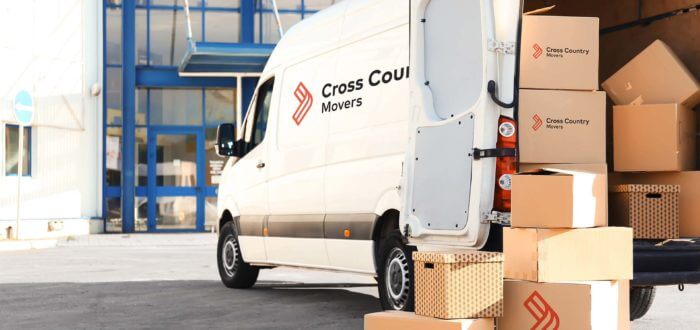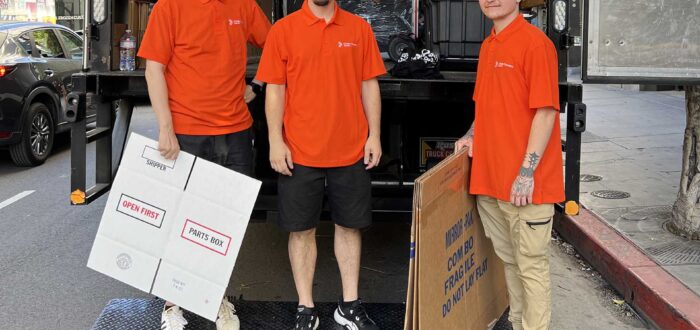

Finding the Best Way to Move Across the Country: Tips and Tricks
Posted in Moving Essentials on November 7, 2023
Statistically speaking, an individual in the USA relocates 11.7 times during their lifetime. Finding the best way to move across the country becomes a pressing concern, especially with such frequency. This guide aims to shed light on effective methods and strategies, ensuring that each transition is as smooth and hassle-free as possible, regardless of the distance covered. With the help of our tips and tricks, expect moving cross-country to be hassle-free.
What Is the Best Way to Move Across the Country?
The best and easiest way to relocate across the country involves a blend of careful planning, organization, and resource optimization. Prioritizing the safety of belongings is paramount, followed by setting a realistic budget and timeline. Evaluating companies offering cross-country moving services based on reputation, service offerings, and customer feedback can pinpoint the ideal partner for such a significant task.
On top of this, consider downsizing before the journey, creating a comprehensive relocation checklist, and staying informed about regulations or requirements specific to the destination can streamline the process, ensuring a smoother relocation experience.
Tips for the Pre-Move Preparation Process
Before diving into the logistics of this endeavor, it’s essential to pause and strategize. To relocate efficiently, individuals should first take a moment to assess their unique situation and needs. What are the priorities? What challenges could arise?
Do this preliminary evaluation, so it becomes easier to plan the relocation with clarity and foresight, ensuring a smoother process from start to finish. Asking oneself the right questions and being honest about potential mistakes and obstacles can make all the difference.
Consider Your Budget Constraints
Every transition comes with its set of financial implications. Establishing a clear relocation budget from the outset can help steer the entire process in a direction that’s both practical and economical. It’s important to account for hidden costs, potential overages, and unforeseen expenses.
Be proactive and consider ways to save money to relocate, like opting for cost-effective services or selling unused items, individuals can strike a balance between quality and affordability in their relocation choices.
Determine the Timeline of the Relocation
Creating an overall timeline is one of the most important tasks before you move on to other aspects of relocation. Consult our list to help pinpoint your relocation timeline:
- Evaluation phase: Allocate 1-2 weeks for researching and selecting a long-distance moving company.
- Preparation phase: Set aside 2-4 weeks for decluttering, packing, and organizing.
- Notice period: Give a 30-day notice if renting, ensuring enough time to handle any lease-related tasks.
- Logistical coordination: Allow at least 1 week for finalizing details with the company.
- Contingency time: Incorporate an additional 3-5 days for any unforeseen delays or challenges.
Decide on the Number and Types of Items You’ll Be Moving Across the Country
A significant part of preparation is sorting through possessions. Not only does this step help pack efficiently, but it also provides an opportunity to re-evaluate the value and necessity of items.
One effective way to handle excess belongings is to donate unwanted items to an organization like The Salvation Army, providing them with a new purpose and aiding those in need. Furthermore, organizing a garage sale can be a fantastic way to declutter and generate some extra funds.

Hire a Professional and Trustworthy Long-Distance Moving Company
Pinpointing professional and reliable long-distance movers is of utmost importance. It’s more than just transportation – it’s entrusting a company with the contents of one’s life. The first step is to check if the company is legitimate, ensuring they have the proper licenses and credentials to operate across state lines.
Seeking recommendations from friends and family members can provide invaluable firsthand accounts of their experiences with potential movers. It’s best to consult The Better Business Bureau where you can read all about the company’s reputation, allowing you to make a well-informed decision.
Choose the Services That Would Make Your Relocation Effortless
Every moving process has its unique challenges and requirements. It’s essential to tailor the services to your specific needs. For instance, individuals with vehicles might consider car shipping services, eliminating the strain of a long drive.
Those overwhelmed by the idea of boxing up their possessions might lean towards professional packing services, ensuring items are secure and organized. It’s always a good strategy to ask cross-country movers about their range of offerings.

Learn Essential Packing Tips for a Cross-Country Move
Embarking on a cross-country relocation means ensuring belongings reach their destination intact and organized. A cornerstone of this is mastering the art of packing. To begin, it’s essential to organize packing in a manner that’s systematic and logical. A common strategy many adopt is the room-by-room approach, allowing for clearer categorization.
Always start the packaging first with the items that are infrequently used or seasonal, ensuring daily essentials remain accessible. As the date approaches, gradually pack the rest, leaving day-to-day necessities for packaging last. This ensures minimal disruption to daily routines and maximizes packing efficiency.
Gather Packing Materials You’ll Need
Preparing correct packing supplies not only streamlines the process but also ensures that belongings are properly protected. Here’s a list of essential packing materials:
- Boxes of various sizes: From small to large, having a range of sizes helps cater to different items.
- Bubble wrap: Essential for cushioning and protecting fragile items.
- Packing tape: Strong adhesive tape for sealing boxes securely.
- Packing paper: Useful for wrapping items and filling empty spaces in boxes.
- Permanent markers: For labeling each box.
- Stretch wrap: To secure items that might open during transit.
Implement a Special Strategy For Packaging Fragile Items
Protecting fragile items is crucial. The key is to cushion and isolate them to minimize movement and potential damage. Begin by wrapping each fragile item individually in bubble wrap, ensuring ample padding.
Once wrapped, place them in a box layered with crumpled packing paper at the bottom for added cushion. Avoid overpacking boxes. Instead, fill any remaining space with more crumpled paper to prevent items from shifting. Seal the box securely and mark it as “FRAGILE” on all sides.
Label Each Box Clearly
Effective labeling is a game-changer when it comes to unpacking in the new location. Each box should have a clear label indicating its contents and the room it belongs to. Here are some labeling tips:
- Use permanent markers: These ensure that labels don’t smudge or fade during transit.
- Be specific: Instead of just writing “kitchen,” mention “kitchen – pots and pans” for clearer identification.
- Color coding: Assign a color to each room and use colored stickers or tape to quickly identify boxes by room.
- Numbering system: Number each box and keep a master list detailing the contents of each numbered box.

Use Our Tricks for Saving Money for Relocation
Relocating can be a hefty undertaking, both logistically and financially. However, by employing some strategic cost-saving measures, individuals can alleviate some of the financial burdens associated with moving. These savings can be significant, especially when you’re looking to relocate to a new home and set up anew.
Costs can be minimized. It’s not just about spending less – it’s about maximizing the value of every dollar spent during the process.
Ask About Discounts and Promotions
In a competitive market, many long-distance moving companies offer promotions, discounts, or special packages to attract clients. Before finalizing a deal with any company, always inquire about any ongoing promotions. Seasonal deals, loyalty discounts, or even first-time customer incentives can make a noticeable difference in the overall cost.
Familiarize Yourself With Tax Deductions for Relocating
When relocating, especially for work-related reasons, there might be potential tax deductions available. Some of these deductions can cover costs associated with transportation, storage, or even temporary housing. It’s essential to keep all move-related receipts and documentation. For detailed information on eligible deductions and guidelines, you should visit the official IRS website or consult a tax professional.
Start Budgeting and Relocate During Off-Season
Timing can influence the final expenses. Late autumn and winter are generally considered off-season for moving companies, translating to potentially lower rates and more availability. By choosing to relocate during these times, you can benefit from discounted services.
On top of this, establishing a detailed budget ahead of time provides clarity on anticipated expenses and potential areas for savings. This budget should account for all relocation-related costs, from packing materials to transportation fees.
Watch the following video for the ultimate advice on how to save money:
Prepare for Manage Unforeseen Challenges
Every journey, especially one as significant as relocating, is bound to have its unexpected bumps. While careful planning can mitigate many challenges, there are always variables beyond control. From weather disruptions to logistical snags, relocation mistakes can happen, even with the best of intentions. Preparing mentally and logistically for these unforeseen challenges is essential.
Have an Emergency Fund
An emergency fund acts as a financial cushion, providing security against unexpected costs that might arise. Whether it’s unplanned storage fees, additional transportation costs, or unforeseen repairs, having a monetary buffer can be the difference between a crisis and a manageable hiccup. It’s always wise to set aside a portion of the relocation budget specifically for these unanticipated expenses, ensuring a smoother financial journey.
Make Backup Accommodation Plans
Despite best efforts, sometimes things don’t align perfectly. Maybe the new residence isn’t ready for move-in, or there’s a delay in the delivery of belongings. In such instances, having a backup accommodation plan is invaluable.
This could be a pre-researched list of nearby hotels, motels, short-term rentals, or even arrangements with friends or family. Have a contingency lodging plan, and ensure a safe and comfortable place to stay during any unexpected delays.
The Key is To Stay Relaxed and Manage Stress
Relocation, while exciting, can undeniably induce a fair amount of stress. Recognizing and addressing this relocation stress is vital for both mental and physical well-being. Here are some tips to maintain calm and combat stress:
- Stay organized: Having a clear plan and checklist can make tasks feel more manageable.
- Take breaks: When overwhelmed, step back, breathe, and take a short break to refresh.
- Ask for help: There’s no shame in seeking assistance, whether it’s physical help with packing or emotional support.
- Maintain routine: Keeping up with regular activities, like exercise or hobbies, can provide a sense of normalcy.
- Stay positive: Focus on the exciting aspects of the relocation, and remember that challenges are temporary.

Have the Ultimate Best Team Relocate You Across the Country
Navigating the journey of a cross-country relocation is no small feat, but with the right preparation and a keen awareness of potential challenges, the road can be much smoother. From effective packing strategies and smart financial planning to managing the unforeseen, the journey is all about making informed choices.
Remember, the essence of a successful relocation is not just about the destination but also the quality of the journey. And for that unparalleled experience, who better than experts to guide you? So, don’t hesitate to contact us, Cross-Country Movers. We’re here to turn your relocation dreams into reality.
How Long Does a Cross-Country Move Usually Take?
The duration varies based on distance and method, but for a standard relocation with a professional moving company, it can take anywhere from a few days to two weeks. If driving a rental truck or personal vehicle, it typically takes 3-7 days, depending on stops and driving hours per day.
What Are the Risks of DIY Cross-Country Moving?
DIY cross-country relocations come with potential risks, including personal injury from lifting heavy items, damage to belongings due to improper packing, and unforeseen vehicle complications on long road trips. Additionally, such moves can be more stressful and time-consuming without professional assistance.
Can I Move My Car Across the Country?
Yes, you can relocate your car across the country either by driving it yourself or by utilizing car shipping services offered by many professional moving companies. The choice often depends on factors like budget, car condition, and personal convenience.
What Is the Best Way to Move a Car and Furniture Across the Country?
The best way to move furniture across the country as well as your vehicle, is to hire a professional relocation company and trust an experienced team to load and unload cherished possessions. Doing everything yourself is too complicated, especially if you are relocating for the first time.
How Do I Prepare My Pets for a Cross-Country Relocation?
Preparation for pets involves visiting a vet for a health check-up, updating identification tags, and familiarizing them with their travel carriers in advance. During the journey, ensure regular stops for breaks, keep them hydrated, and maintain a calm environment to reduce stress.
Is It Possible to Relocate Plants Across State Lines?
While it’s possible to move plants, certain states have regulations and restrictions due to pests and diseases. Always check with the USDA or local agricultural departments beforehand.
Are There Any Items I Can’t Relocate Across the Country?
Yes, certain items like hazardous materials, perishable foods, and some plants might be restricted by professional moving companies due to safety concerns and state regulations. Always check with your moving company for a list of non-allowables before packing.
How Do I Find a Reliable Moving Company?
To find a reliable moving company, start by seeking recommendations from friends and family, reading online reviews, and verifying their credentials and affiliations, such as with the Better Business Bureau. Furthermore, always request in-home estimates from multiple companies for comparison and clarity on services and costs.






